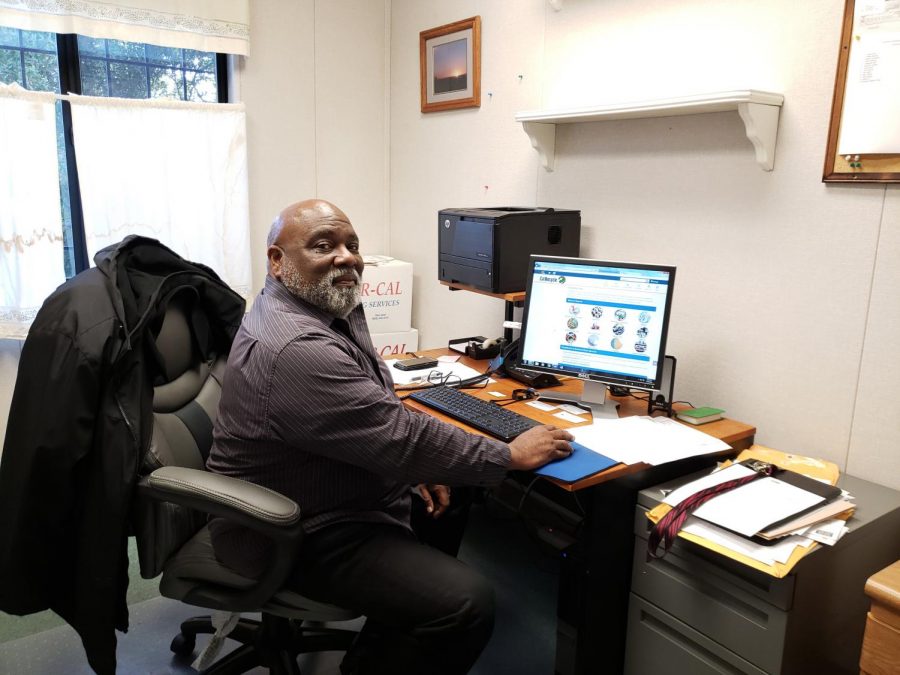Eco-friendly adviser hired
Daniel Hernandez / The Advocate
Dwight Calloway serves as the interim custodial manager of Contra Costa College beginning January 2019.
Feb 27, 2019
This past January, Contra Costa College welcomed Dwight Calloway as interim custodial manager to campus on an environmental stewardship. His job, until June 30 is to stay current on waste reduction and work through strategies to improve waste disposal.
Calloway has years of experience improving the carbon footprint of California’s community colleges.
He worked at Barstow College as the maintenance and operations director, and at Solano Community College from which he retired in 2015.
He then went to Laney College where he was the interim director of facilities.
“I have 26 buildings on this campus, which consists of approximately 300,000 square feet,” he said. Calloway manages a staff of 13 people throughout the day to service these structures.
“During the day, they go around these buildings, go in the rest rooms, dump the trash because there’s so much going on,” he said. “During the evening, they clean the floors and facilities.”
Calloway said reducing landfill waste and addressing climate change are some of the things that interest him most because of his children and grandchildren’s future.
He wants to focus on waste, landfill and energy reduction as well as sustainability, which is what he has been doing for years.
Buildings and Grounds Manager Bruce King said, “Mr. Calloway comes with over 30 years of maintenance and custodial experience. He is an experienced manager who is very conscientious.” Calloway said, “I look around the campus and I see maybe a lack of recyclability, maybe a lack of procedures as far as disposal of the different type of waste that we do have.”
For Calloway waste reduction goes further than just to the landfill, it counts for the emissions of gases into the atmosphere like greenhouse gases and carbon emissions. Both are byproducts of waste.
“The education and knowledge that we need to pass onto our next generation is most important to me,” he said. “There have been places where we’ve had student involvement because if I don’t get student involvement or student buy in, it’s not going to work the way we want it to work.”
The custodial manager says students have the ability to drive other students to partake in caring for the environment.
“Every day should be Earth Day,” Calloway said. “During Earth Day you will see dozens of students take part in acts like coastal cleanups and recycling.”
“That’s where it begins, with helping the environment,” he said. “Students should try to be aware and to challenge each other.”
For instance, there’s a competition between many colleges called “RecycleMania” that inspires schools to benchmark and eliminate their waste.
Some students feel proper labeling will help everybody recycle more here on campus.
“Some trash cans don’t have labels. Like is it recycle or compost?” computer science major Arjay Escalona said. “I think they do a good job recycling in this campus though. I don’t see them every single day.”
Calloway said that any organization or individual who wants to further reduce waste can go to www.calrecycle.ca.org, which has important resources and information.
“Most trash cans have liners also. That’s a cost for each liner that you have. If you look around in offices (on campus), you’ll see every desk has a trash can and every trash can has a liner,” he said.
That means every time they go to clean those bins, they have to replace the bag, which he says is a huge waste and also a large expense the college is paying for.
“We’ve become comfortable with not getting up from our desks, taking our food waste containers and throwing them away in the garbage can instead of in the recycle bin,” Calloway said as he gave a look into what’s inside his office trash can.
So far, he’s just created a few pieces of trash in there since starting back in January. The reason behind this is he diligently gets up from his seat and walks to the break room to throw out his waste in a central garbage can because it uses fewer resources to discard his waste.
In a mass email sent out Jan. 29 to all the staff at CCC, he highlighted some important procedures when it comes to waste disposal.
A portion of the email was to encourage all district facilities to purchase paper with the highest percentage of post-consumer waste.
Not only does this save money in the long run, but it is a sustainable product, he said. Implementing waste reduction methods can save natural resources, decrease associated purchasing costs and increase efficiency.



